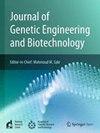Algal L– asparaginase: Antioxidant activity, mitigation of acrylamide in fried potato chips, sensory quality and immobilization
IF 2.8
Q3 Biochemistry, Genetics and Molecular Biology
Journal of Genetic Engineering and Biotechnology
Pub Date : 2024-12-21
DOI:10.1016/j.jgeb.2024.100450
引用次数: 0
Abstract
Background
Several microalgae and macro-algae have been showed considerable promise bio-material in various multidisciplinary fields. l-asparaginase (l- ASase) have a greater reduction effect on the formation of acrylamide in heated carbohydrate food products such as potato chips and bakery produced at high temperatures (above 120 °C). Acrylamide showed neurotoxic and carcinogenic effects in experimental animals and humans. The immobilized of l-asparaginase (l-ASase) in chitosan nanoparticles have used as a strategy to produce efficient and efficacious biocatalysts.
Result
L-asparaginase (l-ASase) extracted by 1-butyl 3-methyl imidazolium chlorideionic liquid (IL, 0.2 mmol/L) reagent from five macro and 3-micro-algae species was evaluated for its scavenging radical activity and its application (ranges of 0.5 IU − 2.0 IU) for reduction of acrylamide (ACA) content in raw potato chips prior to the fried at 170 °C for 8 min. The isolated algae (l-ASase) showed a scavenging activity toward DPPH radical, in effective dose dependent manner and pre treated of slits of potatoes causes a high reduction effects in ACA contents (>88 %) in potato chips products. These products showed a good sensory quality (texture and acceptability). l-ASase of Spirulina platensis was chosen to immobilized into chitosane, which showed a higher enzyme yield (90 %) and enzyme activity as compared to the free enzyme. The pretreatment of potatoes with immobilized l-ASase of Spirulina platensis causes high reduction of ACA formation in potato chips products.
Conclusion
It was concluded that the pre-treated of potato’s with chitosan-immobilized asparaginase is an effective method for mitigation of acrylamide. The higher affinity immobilized l-ASase on chitosan was confirmed, and could be a applied as a cost-effective tool for subsequent use in the therapeutic and in heat food industries sectors.
藻类L -天冬酰胺酶:抗氧化活性,减少油炸薯片中的丙烯酰胺,感官品质和固定化
微藻和巨藻是近年来在多学科领域显示出巨大潜力的生物材料。l-天冬酰胺酶(l- ASase)对加热的碳水化合物食品(如薯片和在高温(120°C以上)下生产的面包)中丙烯酰胺的形成有较大的减少作用。丙烯酰胺在实验动物和人体中显示出神经毒性和致癌作用。壳聚糖纳米颗粒固定化l-天冬酰胺酶(l-ASase)是制备高效生物催化剂的一种方法。结果用1-丁基- 3-甲基咪唑氯离子液体(IL, 0.2 mmol/L)试剂从5种大型和3-微藻类中提取L-天冬酰胺酶(L- asase),评价其清除自由基的活性,并评价其在170℃煎炸8 min前对生薯条中丙烯酰胺(ACA)含量的影响(0.5 IU ~ 2.0 IU)。以有效剂量依赖的方式,对马铃薯切口进行预处理,可使薯片产品中ACA含量降低88%。这些产品表现出良好的感官质量(质地和可接受性)。选择螺旋藻的l-ASase固定在壳聚糖中,其产酶率(90%)和酶活性均高于游离酶。固定化螺旋藻l-ASase对马铃薯进行预处理后,薯片制品中ACA的形成量大幅降低。结论壳聚糖固定化天冬酰胺酶预处理马铃薯是抑制丙烯酰胺的有效方法。结果表明,壳聚糖固定化l-ASase具有较高的亲和力,可作为一种经济有效的工具,用于后续的治疗和热食品工业领域。
本文章由计算机程序翻译,如有差异,请以英文原文为准。
求助全文
约1分钟内获得全文
求助全文
来源期刊

Journal of Genetic Engineering and Biotechnology
Biochemistry, Genetics and Molecular Biology-Biotechnology
CiteScore
5.70
自引率
5.70%
发文量
159
审稿时长
16 weeks
期刊介绍:
Journal of genetic engineering and biotechnology is devoted to rapid publication of full-length research papers that leads to significant contribution in advancing knowledge in genetic engineering and biotechnology and provide novel perspectives in this research area. JGEB includes all major themes related to genetic engineering and recombinant DNA. The area of interest of JGEB includes but not restricted to: •Plant genetics •Animal genetics •Bacterial enzymes •Agricultural Biotechnology, •Biochemistry, •Biophysics, •Bioinformatics, •Environmental Biotechnology, •Industrial Biotechnology, •Microbial biotechnology, •Medical Biotechnology, •Bioenergy, Biosafety, •Biosecurity, •Bioethics, •GMOS, •Genomic, •Proteomic JGEB accepts
 求助内容:
求助内容: 应助结果提醒方式:
应助结果提醒方式:


